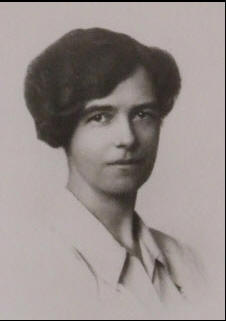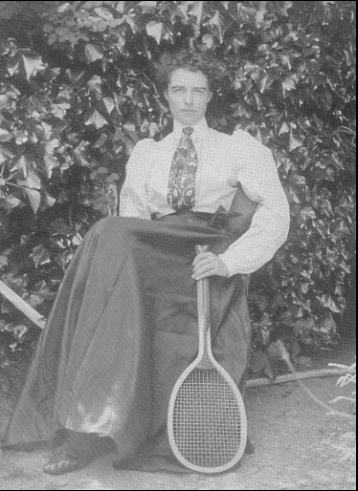

Partner Margaret Haig
Queer Places:
Cheltenham Ladies' College, Bayshill Rd, Cheltenham GL50 3EP, UK
Lamb House, West St, Rye TN31 7ES, UK
38 Cheyne Walk, Chelsea, London SW3 5HJ, UK
Bay Tree Lodge, 1B Frognal, London NW3 6XX, UK
70 Arlington House Apartments, 17-20 Arlington St, St. James's, London SW1A 1RL, UK
Winterfold End, Hound House Rd, Shere, Guildford GU5 9JJ, UK
 Theodora Bosanquet (October 3, 1880 – June 1, 1961) was a secretary,
writer and reviewer, Henry James’s amanuensis – his “Remington priestess” –
Literary Editor of Time and Tide, and from 1933 the partner of
Margaret Haig, Lady Rhondda.
According to Cicely Hamilton’s biographer, Liz Whitelaw, Margaret Haig lived
for many years with Theodora Bosanquet and the destruction of her personal
papers on her death was to disguise that relationship. After working for the
Ministry of Food (for which she was awarded her M.B.E), from 1920 to 1935,
Theodora was Executive Secretary of the International Federation of University
Women and was on the Board of Time and Tide from 1943 to 1958. She has been
fictionalised in three 21st century novels. She became a literary model for
the character of "Frieda" in Michiel Heyns' "The Typewriter's Tale" (2005), a novel about the
last years of Henry James; the play "Ghost-Writer" by Michael Hollinger
(premiere Cincinnati, October 2011) is loosely based on the story of James and
Bosanquet.
Theodora Bosanquet (October 3, 1880 – June 1, 1961) was a secretary,
writer and reviewer, Henry James’s amanuensis – his “Remington priestess” –
Literary Editor of Time and Tide, and from 1933 the partner of
Margaret Haig, Lady Rhondda.
According to Cicely Hamilton’s biographer, Liz Whitelaw, Margaret Haig lived
for many years with Theodora Bosanquet and the destruction of her personal
papers on her death was to disguise that relationship. After working for the
Ministry of Food (for which she was awarded her M.B.E), from 1920 to 1935,
Theodora was Executive Secretary of the International Federation of University
Women and was on the Board of Time and Tide from 1943 to 1958. She has been
fictionalised in three 21st century novels. She became a literary model for
the character of "Frieda" in Michiel Heyns' "The Typewriter's Tale" (2005), a novel about the
last years of Henry James; the play "Ghost-Writer" by Michael Hollinger
(premiere Cincinnati, October 2011) is loosely based on the story of James and
Bosanquet.
Theodora Bosanquet was the daughter of Gertrude Mary Fox, who was related to the Darwins, and Frederick C. T. Bosanquet, who came from a Huguenot family. She was born in what is now Sandown-Shanklin on the Isle of Wight, where she spent her childhood and adolescence and then lived in Lyme Regis. She attended one of the first institutions for female students, Cheltenham Ladies College, run by women's rights activist Dorothea Beale; She decided to go to University College, London, where she graduated with a B.Sc. She then enrolled in the Secretarial Bureau of Miss Mary Petherbridge (Conduit Street, London) and learned shorthand and secretarial work; here she also got the chance to work for Henry James, whose writings she greatly appreciated; she learned typewriter writing on a Remington, as the sound was indispensable for Henry James at work. From October 1907 she worked as his secretary - for 25 shillings per week - and remained so until his death in 1916.
Theodora was very educated and committed, and soon became indispensable for Henry James. Although he was known for preferring employees without his own opinion, he soon reported to his brother about the new excellent "Amanuensis" (= writing assistant of a scholar), the young burschikose Miss Bosanquet. She moved to Rye, where she lived with Mrs. Holland (Marigold Cottage, Mermaid Street), very close to Henry James' Lamb House, and became friends with Nellie Bradley, the daughter of the travel writer Arthur Granville Bradley, a walking friend of Henry James, who lived in the Red Cottage in Rye. Other friends included Rose Macaulay, Clara Smith and Naomi Royde-Smith. She shared with some of them an interest in the occult, spiritualist sessions and supernatural phenomena (as well as mesmerism); with Henry James' brother, the psychologist and philosopher William James, she discussed these issues with increasing efficiency; both were also fascinated by "automatic writing". In addition to this penchant for occult, she was a wise and independent-thinking young woman and convinced early feminists. She attended a lecture on women's rights in Rye with Henry James and his niece. Through him she also met Edith Wharton, with whom he had a long-standing, very intimate, Platonic friendship.


The poor health of Henry James in the last year of his life brought an additional workload for Bosanquet, which was soon removed by the intervention of James' sister-in-law, his niece and nephew: she was only allowed to continue some editorial tasks, but her access to James was restricted, which made her very sad. Theodora Bosanquet noted in her diary that the two sisters of John Singer Sargent, Emily Sargent and Violet Sargent Ormond, came to stay with James the night after he collapsed from his second stroke, and they were seldom away from his residence in the weeks to come.
Edith Wharton and Theodora Bosanquet's greatest fear was that Harry James, of all people, should be given the task of editing his uncle’s correspondence. First meeting him made a definite impression on James’s secretary, who scribbled this wary description in her Diary: “[N]early white-haired, but still black-moustached,” she noted. “He has a tremendous chin—the most obstinate-looking jaw.” Bosanquet’s nervous apprehension was justified. Distrusted by the family—who also were leery about her lesbianism —she soon was banished from Carlyle Mansions and kept very much at a distance from the final disposition of James’s manuscript remains. Despite her long familiarity with her employer’s difficult handwriting, Bosanquet essentially was dismissed by Percy Lubbock, when Harry insisted that her help in transcribing and typing up letters was neither needed nor wanted. Edith Wharton was afraid that this cruel separation would “kill” Little B. (the affectionate nickname that Wharton and Lubbock had bestowed upon her), but from the sidelines, Theodora Bosanquet remained ever faithful, writing important commemorative articles and publishing (in 1924) her still very useful discussion of Henry James at Work.
After Henry James' death, she was an assistant in the Who's Who department of the War Trade Intelligence for the last two years of World War I and assistant in the Ministry of Food from 1918 to 1920. In 1919, she honored the British government with the "Member of British Empire" for its commitment to the war and immediately thereafter.
From 1920 to 1935 she was Executive Secretary of the International Federation of University Women (IFUW) and was a close friend of the Norwegian chemist Ellen Gleditsch (IFUW Chairman from 1926 to 1929); she began to build connections between women with university or college degrees around the world, to inform about their achievements and to make it clear how difficult it was for female academics to defend their professional interests. She held an additional position from 1927, when she became the first chairwoman of the library committee of the Sybil Campbell Collection at the University of Winchester, a foundation to which she also bequeathed her library. Partly because of her work, Bosanquet spent a lot of time travelling around the world: she visited the United States, Greece, Palestine, Egypt, and Australia, among others.
In November 1929, the North American and later Henry James biographer Leon Edel visited Bosanquet in London. His impression of the now 49-year-old was that of a medium-sized woman, open and direct, with clear blue eyes, who confronted him in her small, muddy office in Chelsea with a welcome smile, but at the same time with a certain restraint. From this meeting a lively correspondence developed, in which she also repeatedly came to the strenuous side of her work at IFUW, the effects on her private life and on her interests in the field of literature.
In Margaret, Lady Rhondda, the founder of the left-leaning feminist weekly Time and Tide, she found a friend with whom she had a lot to do: her love of literature and also the fear of being alone. After a joint sea voyage, they decided to move together. From 1933 they lived either in London (1b Bay Tree Lodge, Frognal, and from 1949 at 70 Arlington House, St. James) or in Shere / Surrey (Churt Halewell). After Margaret's death in 1958, Theodora inherited the house in Surrey and was one of the executors of the will.
Tired of working for IFUW and travelling, she decided in 1935 to change her circumstances; she wanted to rest and find time for her own creative work. The opportunity to do this came with the offer to work at Time and Tide. In November 1935, she wrote to Leon Edel that there had been some changes in her life: she had quit her job at IFUW and started working for Time and Tide and had moved from Chelsea (38 Cheyne Walk) to Hampstead Heath. Between 1935 and 1953, Theodora worked in the literary editorship of Time and Tide, and from 1943 to 1958 she was on the board of directors. She also published poems and wrote reviews: for example, in June 1938, she reviewed Virginia Woolf's "Three Guineas" and read parts of the book Lady Rhondda, which then wrote an enthusiastic letter to Virginia Woolf.
Bosanquet's penchant for the supernatural was also reflected in the fact that in the 1930s she began experimenting with "automatic writing" and was convinced that she had come into contact with a number of literary figures, including Henry James. The large number of these texts is kept in the Society of Psychical Research, of which she was also a member, at the University Library, Cambridge.
Theodora Bosanquet died at the age of eighty in a London hospital in Kensington.
Her friend, the successful journalist and novelist Naomi Royde-Smith, became the first woman to write the literature editorship of the Saturday Westminster Gazettein 1912, ran a small literary salon with Rose Macaulay in her apartment in Queensgate, Kensington, and encouraged Theodora not to neglect her own literary career: especially her talent for parodying the work of other writers, especially Henry James; as an example of this can be called "Afterwards", published on January 23, 1915 in the Gazette; together with Clara Smith, Bosanquet wrote "The Spectators", a novel in letters, and to their great delight James B. Pinker, literary agent of Henry James and since 1913 also by Bosanquet, with Constable & Co., London, wrote a good contract: the book was published in 1916, although it was not outstanding, made it clear how familiar the author was with modern currents, from futurism to psychoanalysis.
Her numerous surviving diaries (1898-1960) give an interesting insight into the world of literature and are kept in the Houghton Library, Harvard University, Cambridge, MA. The collection "Theodora Bosanquet Papers" there also contains papers that shed light on her connection to Henry James and her literary activities, letters to James, articles and conversations about James, letters from Hogarth Press authors E. M. Delafield, Rose Macaulay, Elizabeth Robins, Edith Sitwell, Rebecca West, Edith Wharton, Virginia Woolf, T. S. Eliot, Rupert Hart-Davies, Charles Williams and others
In the National Library of Ireland you can find letters from the Northern Irish writer Helen Waddell to Theodora Bosanquet between 1927 and 1938.
My published books: